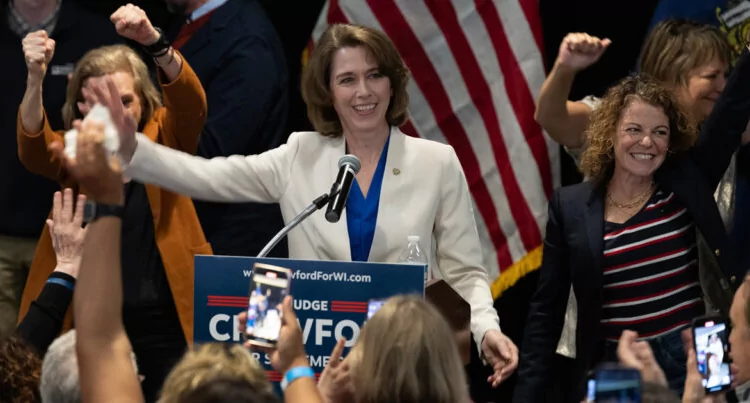
Judge Susan Crawford, a self-described believer in “progressive values,” defeated her conservative opponent Judge Brad Schimel in a special election held on April 1st to fill a vacant seat on the Wisconsin State Supreme Court. As a result, Wisconsin’s highest court will retain its 4-3 liberal majority.
On the same day that Judge Crawford won her seat on the state Supreme Court, Wisconsin voters overwhelmingly approved a constitutional amendment enshrining Wisconsin’s state law voter ID requirement in Wisconsin’s Constitution. Ms. Crawford is not a fan of a voter ID requirement, which she described as “draconian” years earlier when she ran to become a Dane County judge. She has also supported utilizing “alternatives to incarceration” and cashless bail reform.
In short, Judge Crawford, who was endorsed by the progressive group Indivisible, is a reliable vote to further the Left’s policies from the bench.
Democrats gloated over Judge Crawford’s win against Judge Schimel, whom President Trump and Elon Musk had endorsed. The party that suffered humiliating electoral defeats last November is characterizing Judge Crawford’s victory as a sign of a backlash against President Trump and DOGE.
Moreover, the reenergized liberal Wisconsin Supreme Court will likely order the preparation of a new congressional voting map that will help Democrats pick up one or two additional seats in the House of Representatives in next year’s midterm elections. This could possibly hand control of the House back to the Democrats, who will use it to block President Trump’s policy agenda and launch more phony impeachment proceedings.
Last year, the liberal Wisconsin Supreme Court rendered two decisions illustrating its eagerness to legislate from the bench for the purpose of advancing its progressive agenda, which the newly elected Judge Crawford also embraces.
One case involved a challenge to Wisconsin’s legislative requirement that limited the manner of returning absentee ballots to only two methods – by mail or in person to the clerk’s office. There is no mention in the relevant statute that allows absentee ballots to be deposited in a drop box. Nevertheless, Wisconsin’s Supreme Court effectively rewrote the statute by adding drop boxes as a permissible means of returning an absentee ballot.
Another Wisconsin Supreme Court decision ruled against a Catholic charitable institution. This decision exposes how liberal activist judges reach their preferred policy outcomes using tortured “reasoning” to supposedly “interpret” the relevant statute.
The Wisconsin Supreme Court upheld the denial of a religious exemption for Catholic Charities Bureau, Inc. (CCB) and four of its sub-entities. This exemption would have relieved them from having to make contributions to the state’s statutory unemployment insurance system.
CCB appealed this ruling to the U.S. Supreme Court, which has heard oral arguments in the case and is expected to issue its opinion this June.
The case revolves around an interpretation of the relevant statute’s religious tax exemption that is limited to those “[i]n the employ of an organization operated primarily for religious purposes and operated, supervised, controlled, or principally supported by a church or convention or association of churches.”
There was no dispute that CCB and its affiliated entities met the statutory standard of being “operated, supervised, controlled, or principally supported by a church or convention or association of churches.” Moreover, the majority ruling acknowledged their religious motivation in undertaking Catholic Charities’ mission as the Superior Wisconsin Roman Catholic diocese’s “social ministry arm.”
Nevertheless, the Wisconsin Supreme Court’s liberal majority ruling denied the petition for a religious exemption based on its determination that the activities CCB and its sub-entities engage in are “secular in nature.” Therefore, according to this court’s circular reasoning, CCB and its sub-entities are “not operated primarily for religious purposes,” as the statute requires. (Emphasis added)
The ruling played semantics with the word “operated” as used in the statute in connection with “religious purposes.” The liberal majority legislated from the bench by construing the word “operated” to mean that the day-to-day “activities” themselves must be religious in nature, irrespective of the underlying religious mission the activities are intended to serve.
These secular, progressive judges took it upon themselves to wade into religious doctrine to determine what constitutes a “religious” activity. They concluded that since CCB and its sub-entities are not engaging in such activities as worship services and ceremonies, proselytizing, or providing religious education in connection with their charitable work, they are not engaging in “religious” activities. Moreover, their employees and beneficiaries do not have to be Catholic. Therefore, based on this judicially manufactured standard, the majority decided that CCB and its sub-entities are not eligible for the religious exemption and must contribute to the state’s statutory unemployment insurance system.
A dissenting judge sharply criticized the majority’s ruling. The dissenting judge wrote that “the majority improperly entangles itself with religion by asking whether Catholic Charities’ concededly religious activities are sufficiently religious… it treads where the Constitution forbids the judiciary from intruding.” (Underlining in the original)
Several U.S. Supreme Court justices noted the potential for judicial entanglement in religious doctrine and for discriminating among religions in deciding whether a religiously motivated activity by each religion’s affiliated institutions is secular or religious in nature.
For example, Justice Elena Kagan remarked to the Wisconsin Department of Justice’s Assistant Attorney General during the oral argument: “The reason why we’re so worried about entanglement is because it gets us enmeshed in the content of religious doctrine. But your way of doing it, you know, basically puts the state on the side of some religions with some doctrine versus other religions with a different doctrine.”
Justice Neil Gorsuch wondered whether there was discrimination when the Wisconsin Supreme Court “distinguished between religions that proselytize and those that don’t and between those who serve co-religionists and those who serve others as well.”
Judge Susan Crawford will soon be joining her progressive colleagues on the Wisconsin Supreme Court. We can expect this liberal activist court to issue more leftist policy-outcome opinions that far exceed its legitimate judicial authority.














